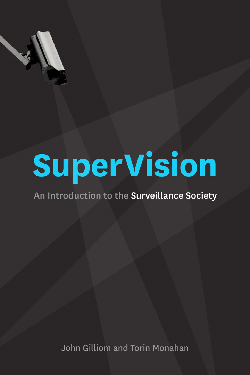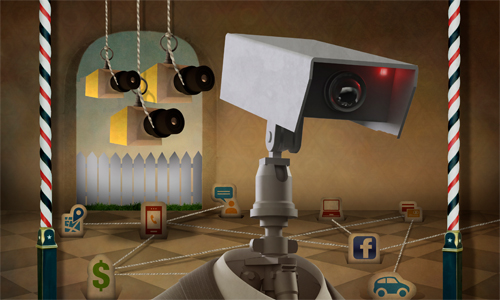Second in a series of articles on our surveillance society.
John Gilliom and Torin Monahan’s book SuperVision: An Introduction to the Surveillance Society is just in time for the national dialogue on surveillance and power.
 “Why do we call this a surveillance society? Because virtually all significant social, institutional, or business activities in our society now involve the systematic monitoring, gathering, and analysis of information in order to make decisions, minimize risk, sort populations, and exercise power. We define surveillance as monitoring people in order to regulate or govern their behavior.” They argue that the power of surveillance brings new modes of governance—from schools to workplaces to society at large—and provide 10 big ideas to help shape the dialogue.
“Why do we call this a surveillance society? Because virtually all significant social, institutional, or business activities in our society now involve the systematic monitoring, gathering, and analysis of information in order to make decisions, minimize risk, sort populations, and exercise power. We define surveillance as monitoring people in order to regulate or govern their behavior.” They argue that the power of surveillance brings new modes of governance—from schools to workplaces to society at large—and provide 10 big ideas to help shape the dialogue.
Ten Big Ideas
- Terms like “Big Brother” and “right to privacy” are so yesterday. A smarter way to think about surveillance: Understand surveillance as “a form of power and governance woven into the fabric of our lives. Surveillance is no longer a brief intrusion or a scary idea from a movie, it’s a way of life. It’s our way of life.”
- It can be good, even fun! “At first glance, some types of surveillance look like fun and don’t seem to threaten values like liberty, equality or democratic governance…. There’s some enjoying, engaging and productive stuff going on.”
- Big government or big business? Governments are important players, but most of the innovative new surveillance initiatives are coming from the corporate sector, which frequently links up with governments in a contractual relationship…a contemporary fusion of corporate and government power.
- The new self: shape and make. “Surveillance does more than just watch…. Surveillance also shapes our ‘selves’ by creating odd edited versions of who we are (a test score, a driving record, a credit risk) to form the basis for decisions about us. And surveillance makes our world by establishing patterns of reward and punishment that guide our choices and behavior.”
- We asked for it. “No one ordered us to get cell phones, but when we did, we logged ourselves in to one of the best surveillance networks ever devised….We have to acknowledge the surveillance programs that people sign up for, support, or even do to themselves.”
- Space-time warp. “Your credit card company can be ‘watching’ you from half-way around the world. Your blog posting today will be a retrievable part of your life far into the future. A grade in a college course is forever…. The normal boundaries of space and time erode to open each moment to the possibility of global permanence.”
- The underground resistance. “There may a massive uncelebrated anti-surveillance movement formed by all the people who cheat, lie, evade, trick or otherwise undermine surveillance programs. These activities, sometimes called ‘everyday resistance,’ are a controversial part of the politics of surveillance … not quite crime, not quite politics, not quite honorable, but sometimes noble.”
- Race, class and gender. “Systems of surveillance are often unique new expressions of power, but they join existing social patterns tied to inequalities of race, class, and gender…. While something like financial surveillance may become more color-blind, surveillance at border crossings brings seemingly inevitable intensifications or race-oriented profiling.”
- Junk in. Junk out. “As pervasive and impressive as surveillance systems are, they don’t always work…. Security cameras don’t really prevent crimes…. Amazon.com shopping recommendations can be comically wrong…. Surveillance may not work perfectly, but people still believe in it and act on it.”
- There may not be much we can do about it. “Scientific rationalism is the dominant mentality of our time, leading to an insatiable hunger for information… to make smart choices. This is in many ways the modern definition of responsible decision making. In this world, is there any room for anti-surveillance claims that argue for, essentially, reducing the flow of information?”
Watch the Forum for the next in a series of excerpts from SuperVision: An Introduction to the Surveillance Society, published by the University of Chicago Press.
Previously in this series: SuperVision: With Surveillance Comes Power



















2 Comments